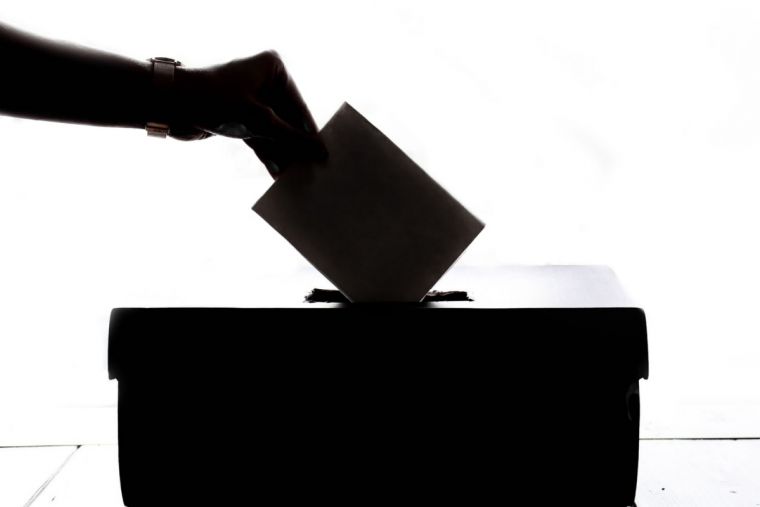To vote or not to vote?

Is the Mail on Sunday columnist and Anglican Christian, Peter Hitchens, right about not voting in elections?
He argues that if you go into a shop and you don't like any of the goods on sale, you don't buy. By analogy, he doesn't like any of the political parties on the ballot paper, so he doesn't vote.
But is a consumer approach to voting right for Christians? Is there a moral duty to take part in the governance of the country by exercising a democratic right that was hard-won by previous generations of Britons? Can voting really be compared to shopping?
At least here in Lancashire, where I live, there is the chance to vote against the lockdown political consensus in May's election of the Police and Crime Commissioner. Reform UK, which has opposed the lockdown against the vast majority of Conservative, Labour and Liberal-Democrat politicians, both nationally and locally, is fielding a candidate.
But the problem with Reform UK for a Gaullist Christian Democrat like me is that it tends to libertarianism. I am in favour of strongly-enforced anti-drug laws whereas libertarians lean towards liberalisation, particularly of the law against the use and sale of cannabis. Should I risk voting for a party that could legalise cannabis if it came to power?
I intend to vote Reform UK because in opposing the lockdown they opposed the government-opposed restrictions on Christian churches. The Good Friday outrage in south London when officers of the Metropolitan Police disrupted a church service was lockdown rock bottom for me.
I felt deeply ashamed that this happened in the United Kingdom, the once Christian country my late grandfather thought he was fighting for. He endured 15 months in the trenches before being gravely wounded by shrapnel on his 21st birthday in April 1917. If Alderman Mann were alive today and I were Boris Johnson, I would stay well away from East Yorkshire to avoid a fearsome dressing-down.
The Met subsequently expressed regret at the action by their officers. But the lockdown was not the Met's idea.
Nor would it be the police's decision to introduce vaccine passports for entry into Christian churches. If vaccine passports are imposed, it will have been a Conservative government that did it.
Many Christians have supported the lockdown and the restrictions on church worship because they believed it was their moral duty to do what they could to stop the spread of the virus. But in opposing the lockdown, Reform UK and the Reclaim Party's Laurence Fox, who is standing for London Mayor, have made a moral choice to put freedom, and the risks freedom entails, above the 'stay safe' message of the health and safety cult.
I do not agree with the idea that people should be free to choose an evil such as smoking cannabis with the grave risk to mental health it presents, particularly for adolescents. But I do believe people should be free to go to church, a potentially everlasting good, even if they risk catching or spreading a virus in this fleeting, mortal life.
If the UK government had made the moral choice to avoid the Chinese Communist recourse to lockdown during the Covid crisis, Christians would have been able to meet together physically in their churches without face coverings and social distancing to receive God's word and to sing his praises in obedience to the New Testament command.
The problem with supporting restrictions on corporate Christian worship, albeit for a public-spirited reason, is that it ham-strings God's main agent for transforming his world, the Church of Jesus Christ. If the Lord were to grant a Christian revival in this country, full Bible-teaching churches would be a fruit of it and self-control would become a virtue. In a re-Christianised Britain, legalising cannabis would not be a vote-winner.
The Anglican Book of Common Prayer includes this request to the God and Father of Jesus Christ at Holy Communion: 'We beseech thee to save and defend all Christian Kings, Princes and Governors: and specially thy servant ELIZABETH our Queen; that under her we may be godly and quietly governed: And grant under her whole Council, and to all that are put in authority under her, that they may truly and indifferently (impartially) minister justice, to the punishment of wickedness and vice, and to the maintenance of thy true religion and virtue.'
If Peter Hitchens thinks it is his Christian duty to stay out of what he sees as a sham by not voting, then that is a matter for his conscience. But my Christian conscience inclines me to vote for an anti-lockdown party next month.
Julian Mann is a former Church of England vicar, now an evangelical journalist based in Morecambe, Lancashire.











